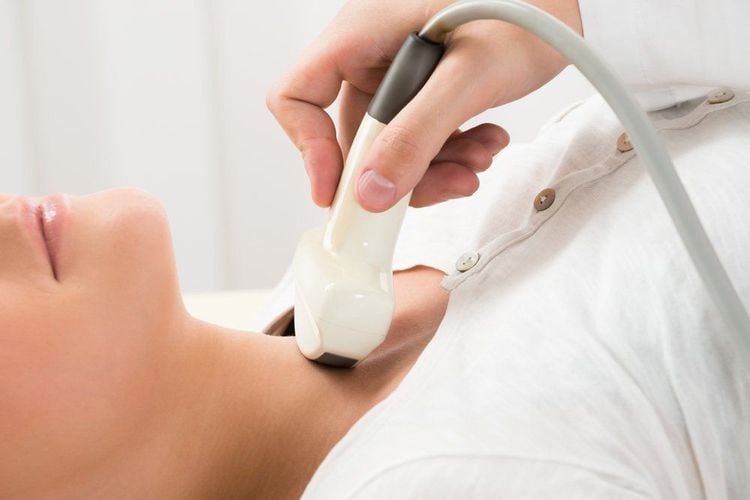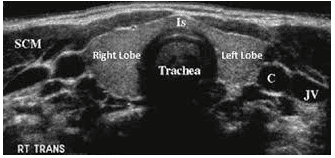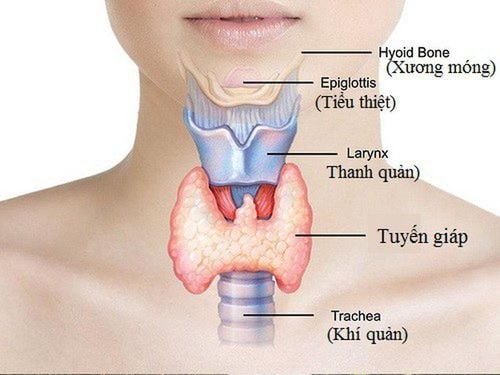This is an automatically translated article.
The article was professionally consulted with Master, Doctor Trinh Van Dong - Radiologist - Department of Diagnostic Imaging - Vinmec Ha Long International Hospital.Thyroid ultrasound is intended for general health examination and is indicated when the clinician suspects a neck tumor, thyroid goiter, mediastinal mass or when the clinical examination is normal but pathology is suspected. thyroid through other tests.
1. Learn about thyroid ultrasound
The thyroid gland is the body's largest endocrine gland, shaped like a butterfly, located in the front of the neck (just above the collarbone) with a lobe on either side of the neck and connected by a narrow band of tissues. The function of the thyroid gland is to make thyroid hormone, which helps regulate many other functions in the human body, including the heart rate.However, the thyroid gland can also experience many diseases, affecting human health. Especially in the condition of nodules, tumors that develop in the thyroid gland. This tumor may not be visible on the surface of the skin, but may be palpable.
Thyroid ultrasound is a diagnostic method through thyroid imaging to detect abnormalities or pathologies in the thyroid gland. The image of the thyroid gland is reflected using sound waves similar to other conventional ultrasounds.

2. Purpose of thyroid ultrasound
When there are functional evaluation tests that show changes or abnormal manifestations to the thyroid gland, the doctor will order an ultrasound of the thyroid gland for the following purposes:
Survey of structures and organs adjacent to the thyroid gland to detect tumors, infections, or lesions. Thyroid ultrasound to guide procedures such as needle biopsies, guide catheter insertion, drainage, and ensure the safest, most accurate needle placement. Identify potential causes of pain or infection in the thyroid gland. Detect and evaluate the properties, location, characteristics, ... formation of thyroid nodules, tumors in organs in the neck region. Analyze the appearance of thyroid nodules, thereby determining whether the nodules are benign or need to be biopsied. Depending on the results and purpose of the thyroid ultrasound, the doctor will advise different care and treatment. You do not need special care if the results are normal, however, if the ultrasound results are abnormal, your doctor will order a biopsy or other tests to make a more accurate diagnosis. .

3. When should thyroid ultrasound?
Localized lesions rarely cause thyroid dysfunction, systemic symptoms are difficult to detect. Therefore, you should have a thyroid ultrasound when:
Routine physical examination: Thyroid ultrasound technique is part of a routine physical examination. An ultrasound can provide high-resolution images of other organs, giving your doctor a better idea of your health. Tense, shaking hands when in a state of excitement warn your thyroid function is increasing. Consciousness and poor concentration: Hyperthyroidism and hypothyroidism can affect neurological function. If you have hypothyroidism, you can feel sad and depressed, and if you have hyperthyroidism, it can lead to loss of concentration. Irregular menstruation: Menorrhagia, hypermenorrhea, and oligomenorrhea can reflect a problem with your thyroid gland. Heat and cold tolerance: People with an underactive thyroid feel cold often, while people with an overactive thyroid often cannot tolerate high temperatures. Edema, fluid retention, increased heart rate, aches and pains, and weight gain all indicate an abnormal thyroid level. High cholesterol: An increase in blood cholesterol levels can occur in people with hypothyroidism.
4. Advantages of thyroid ultrasound
When doing thyroid ultrasound, the doctor will use the transducer of the ultrasound machine placed in the neck area, the ultrasound machine will provide detailed images of the characteristics and properties of the thyroid gland as well as the nearby structures in the neck. . Advantages of thyroid ultrasound include:
It is a completely non-invasive, painless ultrasound method and the cost of performing thyroid ultrasound is quite low. High resolution ultrasound images help doctors see soft tissue structures that cannot be clearly seen by X-ray films. Thyroid ultrasound does not use X-rays or ionizing radiation, so it may be repeated several times in case the doctor needs to examine it more closely. At the same time, it is the safest method of laboratory examination for pregnant women, lactating women and young children. In thyroid ultrasound, ultrasound waves are sound waves and should be considered safe for the sonographer. This is an advantage of thyroid ultrasound, because all studies prove that ultrasound does not have any effect on the body's condition, so you will feel more secure. Ultrasound is used to guide invasive procedures (injections, cytology, aspiration, etc.)

5. Steps to perform thyroid ultrasound
Thyroid ultrasound is usually done in about 20-30 minutes with the following steps:
Step 1: Instruct the patient to lie on an examination table, if necessary, may ask to lie on the side. Or lie face down for a clear ultrasound image. Step 2: Apply special gel in ultrasound on the neck area to be ultrasound and the transducer device. The purpose of the gel application is to help the transducer make safe contact with the body, while eliminating air pockets between the transducer and the skin that block the sound waves. Step 3: Place the probe on the patient's neck skin, then move it back and forth to get thyroid images. During the ultrasound, the image changes continuously as the transducer moves. Then, the image will be recorded on the ultrasound machine screen to help the doctor observe the characteristics of the thyroid area, thereby giving the most accurate diagnosis. Step 4: When the purpose of ultrasound is done, instruct the patient to wipe the gel clean with a towel. The gel will not cause any harm to the body. After conducting an ultrasound, the doctor will read the ultrasound results to the patient so that many health problems can be detected at an early stage. Therefore, this is a procedure that has many advantages, is safe and popular, so people need to have regular check-ups and follow-up to detect abnormalities to overcome and ensure the health of themselves and their families.
If the patient has signs of thyroid disease such as enlarged neck, palpable thyroid mass or abnormalities - thyroid dysfunction such as distraction, nervousness, tremors, tremors, etc. period... should go to the thyroid immediately for diagnosis and timely treatment.
Currently, Vinmec International General Hospital has a package of screening and screening for thyroid diseases. When choosing the Package of Screening and Screening for Thyroid Diseases at Vinmec, you will be examined by experienced thyroid specialists to help screen and detect common thyroid diseases early. variables such as: simple goiter, hyperthyroidism, hypothyroidism, thyroiditis, thyroid nodules, thyroid cancer,...
At the same time, you will have blood tests, evaluate levels of functional hormones thyroid such as FT3, FT4, TSH, Anti - TPO, Anti TG and ultrasound, scan to evaluate the structure of the thyroid gland. After that, when the results are returned to the doctor, you will be consulted about thyroid pathology, and discuss the appropriate treatment options for yourself. From there, thyroid disease will be prevented in time, avoiding long-term health damage in the future.
Please dial HOTLINE for more information or register for an appointment HERE. Download MyVinmec app to make appointments faster and to manage your bookings easily.














